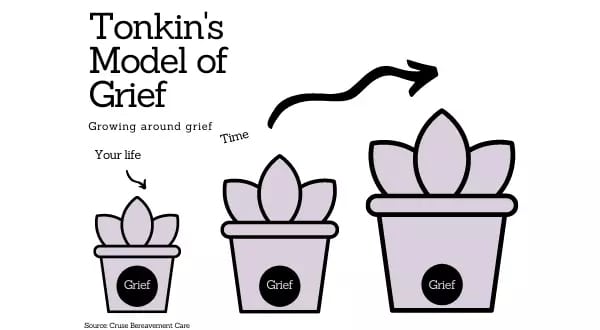Grief can be one of the heaviest experiences, and it is often experienced as a myriad of emotions. In my experience of working with people who are navigating grief, I have discovered that they often are not well-equipped to cope with grief, through no fault of their own. Grief is a subject that is frequently avoided in our culture due to its complicated and uncomfortable nature. However, I have found that once people have a greater understanding of the complexities of grief and allow their unique process to unfold, the healing process can move forward.
In my conversations with clients who are experiencing grief, I have come across three common ideas, or “myths”, about grief that have kept clients stuck and lost in their grieving process. This article intends to challenge and reframe these myths through a practical, therapeutic lens while also providing coping mechanisms for the grieving experience that allow clients to explore and address their grief with non-judgment, mindfulness, and care.
3 Common Myths About Grief
1. You will “get over” your grief at some point.
One of the first questions that clients ask me when they are experiencing grief is, “When will I stop feeling this way?” It is a difficult question to answer because, frankly, there is just no “timeline” for grief. However, when people can take a new perspective on grief and explore individualized coping methods, the journey of healing from grief may seem more hopeful.
A helpful perspective regarding healing grief comes from author and grief counselor Dr. Lois Tonkin. Dr. Tonkin theorized that instead of grief “shrinking” and growing less powerful and insignificant over time, grief actually “stays just a big, but [a person’s] life grows around it” (Cruse Bereavement Support, 2023).
Dr. Tonkin’s framework of grief takes away the pressure of people having to “get over” their grief or constantly wait for their grief to “go away” (2023). Her theory acknowledges that “there will be some days where you feel grief as strongly as you did when [the grieving event] first happened. But there will also be days when you are able to move on with other parts of your life” (2023). Dr. Tonkin shows us that “we can grow a new life which includes loss” (2023).
It is completely okay to be just as devastated 10 or 20 years following a grieving event as when the event first happened. There is nothing wrong with this, and it does not mean that you aren’t healing. You are building a life where you are holding the feelings and emotions of loss. This does not mean you are broken; this means you are human.
2. You will always know when grief is coming.
There may be times where you can easily identify when your grief may feel stronger and more painful such as the anniversary of a death, a deceased loved one’s birthday, or during the holiday season. However, there may be small, everyday moments where your grief surfaces and feels just as strong. There may also be times when you expect grief to be overwhelming, yet when that time comes around, you don’t feel grief as much as you thought you would. All of this is normal and okay. Grief can be unpredictable and confusing, but there are effective coping skills that can help you take notice of when grief unexpectedly surfaces and plan for the more “predictable” and harder times.
For example, if you are experiencing an unexpected moment of grief, mindfulness can be a helpful tool to help you notice what you are feeling and decide how to move forward. It may be helpful to pay attention to what your grief “feels” like: Where do you notice grief in your body? What sensations do you feel? Can you give your grief any defining characteristics such as a color or temperature? Once you notice what your grief feels like in your body, try to allow these feelings to just be. Do not try to force them away, even though they are uncomfortable. Allow grief to exist in your body and hold your grief with tenderness and compassion. You are allowed to feel grief and your grief is valid.
As you are observing and feeling your grief, you may ask yourself: What might I need in this moment to help me move through this grief? How might I take care of myself right now? What is something that might not make me feel completely better but might help me feel loved or safe? Approaching rather than avoiding grief can help you co-exist with it rather than fight it.
For anticipating grief during more difficult times, Dr. Kathy Shear recommends the following principles for managing these difficult times. As a disclaimer, Dr. Shear’s principles primarily focus on grief from the death of a loved one, but some of these principles can be applied to other forms of grief. Her principles include:
- Anticipate and plan for difficult times.
- Find ways to care for the person who died.
- Find pleasurable activities for yourself and other people who are still alive.
- Take care of yourself and let others take care of you (Shear, 2015).
Dr. Shear found that actively and emotionally planning for a more difficult period of grief can help people more effectively cope with this experience. Thinking about what coping skills are helpful to you for grief, what support systems you might reach out to, how you might spiritually or emotionally connect with the person who has passed, as well as spending quality time taking care of yourself or connecting with others may be helpful when experiencing a moment of more intense grief.
3. You only experience grief following the death of a loved one.
While most of us know to expect some form of grief following the loss of a loved one, grief can follow many different events. The Center for Disease Control and Prevention defines grief as a “response to loss of life, as well as drastic changes to daily routines and ways of life that usually bring us comfort and a feeling of stability” (Center for Disease Control and Prevention, 2023).
Think about the times in your life when you experienced a drastic change to your way of life that usually brought you comfort or stability. This could be a break-up, losing a job, moving away from family and friends, or the COVID-19 pandemic. It would not be surprising if you experienced some form of grief following events such as these.
Grief takes many forms and no one form of grief is more valid or significant than another. Recognizing grief, accepting it, and tending to it is more effective for healing and moving forward than judging, criticizing, or invalidating it. A quote from Dr. Kathy Shear insightfully encapsulates the power of taking ownership of grief: “Accepting grief allows us to keep our loved ones with us even as we remake our lives without them” (Shear, 2015). We carry grief with us following loss, and we also have the power and ability to move forward and continue living the lives we desire while holding it close.
Sources:
Center for Disease Control and Prevention (2023). Grief and Loss. Grief and Loss (cdc.gov)
Cruse Bereavement Support (2023). Growing Around Grief. Growing around grief | Cruse Bereavement Support.
Shear, M. Katherine (2015). Managing Difficult Times: A Handout for People with Complicated Grief. Columbia Center for Complicated Grief, Columbia University. New York City, New York. Retrieved from Learning at Wildflower Drive.
Image Source:
Cruse Bereavement Support (2023). Growing Around Grief. Growing around grief | Cruse Bereavement Support.
![]()
Wildflower Center for Emotional Health is a therapy practice with offices in Chicago (River North) and Oak Park, IL. We offer in-person services at each of our locations as well as online therapy to anyone in Illinois. We specialize in perinatal and reproductive health, trauma and PTSD, anxiety and depression, relationships, sex and intimacy concerns, and more.Learn More



